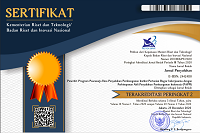Strategi Pengembangan Kinerja Penyuluh Pertanian dalam Pendidikan Jarak Jauh Universitas Terbuka: Kasus Alumni UT di wilayah Serang, Karawang, Cirebon, dan Tanggamus
Abstract
Performance is an implementation of work. For agricultural extension agents, performances are indicators of how well they do the job. The objectives of this research were to determine the level of performances of agricultural extention agent and factors affecting them. Data were collected in July through December 2008. A survey technique was implemented among 111 agricultural extension agents who were graduated from UT and among 88 farmers in four different locations, namely Serang, Karawang, Cirebon, and Tanggamus. By using In depth interview, a qualitative information were also used in order to elaborate the findings. Data was analyzed by using descriptive and path analysis. The findings indicated that UT’s graduates had a high level in performances. Several dominant factors influenced their performances. This study suggests several strategies to increase the performances of agricultural extension agents.
(Keywords: agricultural extension agents, performances, distance education).
Downloads
Authors who publish with this journal agree to the following terms:
- Authors retain copyright and grant the journal right of first publication with the work simultaneously licensed under a

This work is licensed under a Creative Commons Attribution 4.0 International License that allows others to share the work with an acknowledgement of the work's authorship and initial publication in this journal. - Authors are able to enter into separate, additional contractual arrangements for the non-exclusive distribution of the journal's published version of the work (e.g., post it to an institutional repository or publish it in a book), with an acknowledgement of its initial publication in this journal.
- Authors are permitted and encouraged to post their work online (e.g., in institutional repositories or on their website) prior to and during the submission process, as it can lead to productive exchanges, as well as earlier and greater citation of published work (See The Effect of Open Access).















